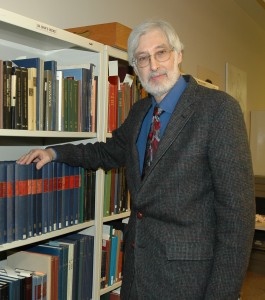- About Ramapo
- Academics
- Admissions & Aid
- Student Life
- Athletics
- Alumni
- Arts & Community
- Quick Links
- Apply
- Visit
- Give
Ramapo College Professor Ira Spar Discovers New Fragment of the Babylonian Flood Story
(PDF) (DOC) (JPG)December 13, 2005

(Mahwah)- Several years ago, Dr. Ira Spar, professor of ancient history at Ramapo College of New Jersey and research Assyriologist at the Metropolitan Museum of Art, was working in the Museum basement cataloging cuneiform tablets when he noticed a small 2 1/2 by 2 1/2 inch clay fragment with the word flood” inscribed in Babylonian cuneiform. Excited by the discovery, Spar sent a hand-drawn copy of the cuneiform text to Professor W. G. Lambert of the University of Birmingham, England, who confirmed Spar’s identification of the text as a missing piece of the Babylonian Flood epic.
According to Spar, several pre-Biblical versions of the flood story are known to scholars. The first, dating to the beginning of the second millennium BCE, was written in Sumerian, the language of the first urban inhabitants of present-day southern Iraq. The newly discovered fragment is part of a slightly later version written in Babylonian and known as the Epic of Atrahasis. In this story the flood hero Atrahasis, meaning Exceedingly Wise,” builds a boat, roofs it over, and makes it waterproof with pitch. Animals and family board the ark as the weather changes. A storm then rages for seven days and nights. At the end of the story, mankind, except for Atrahasis and his family members and animals have perished. Atrahasis and his wife are granted eternal life and dwell on an island at the ends of the earth. According to Lambert, the Atrahasis Epic served as the model for the Biblical story of the Flood.
A translation by Lambert with drawing, photograph, and commentary on this text has just been published by The Metropolitan Museum of Art in Literary and Scholastic Texts of the First Millennium B.C., co-edited by Spar and Lambert. This volume, the second in the series of four cuneiform texts of the Museum’s holdings, examines 106 religious, scientific, scholastic and literary texts and fragments. Each genre is introduced in an explanatory essay by one of eighteen participating scholars.
These cuneiform texts and fragments were acquired largely during the 1880s, when the Metropolitan Museum became the first American museum to collect a substantial number of Babylonian objects. Today the Museum’s holdings total just over six hundred texts and fragments. In 1981, Spar began assembling a group of distinguished scholars to study all the cuneiform texts in the Museum’s collection. The four volumes in this series are intended to make these documents available in a manner that will instruct and inform as wide an audience as possible. Spar has now begun work on Volume IV in the series, a study of temple bureaucracy in ancient Babylonia.
Spar, who teaches ancient history, ancient law, Babylonian, and archaeology at Ramapo College of New Jersey, was co-director of the New Jersey Archaeological Consortium excavation team that unearthed a 3,000 year old center of Biblical Geshurite civilization at Tel Hadar, Israel on the eastern shore of the Sea of Galilee. In 2003 he was part of a team that organized the Metropolitan Museum of Art exhibition, Art of the First Cities.
Literary and Scholastic Texts of the First Millennium B.C. is available online through the Met Store.
###
About Ramapo College
Ramapo College of New Jersey is the state’s premier public liberal arts college and is committed to academic excellence through interdisciplinary and experiential learning, and international and intercultural understanding. The comprehensive college is situated among the beautiful Ramapo Mountains, is within commuting distance to New York City, was named one of the 50 Most Beautiful College Campuses in America by CondeNast Traveler, and boasts the best on-campus housing in New Jersey per Niche.com. Established in 1969, Ramapo College offers bachelor’s degrees in the arts, business, data science, humanities, social sciences and the sciences, as well as in professional studies, which include business, education, nursing and social work. In addition, the College offers courses leading to teacher certification at the elementary and secondary levels, and offers graduate programs leading to master’s degrees in Accounting, Applied Mathematics, Business Administration, Contemporary Instructional Design, Computer Science, Creative Music Technology, Data Science, Educational Leadership, Nursing, Social Work and Special Education, as well as a Doctor of Nursing Practice.
Press Release Archives
| 2025 | 2024 | 2023 | 2022 | 2021 | 2020 | 2019 | 2018 | 2017 | 2016 | 2015 | 2014 | 2013 | 2012 | 2011 | 2010 | 2009 | 2008 | 2007 | 2006 | 2005 | 2004 | 2003 | 2002 | 2001 | 2000 | 1999 |Copyright ©2025 Ramapo College Of New Jersey. Statements And Policies. Contact Webmaster.

Follow Ramapo